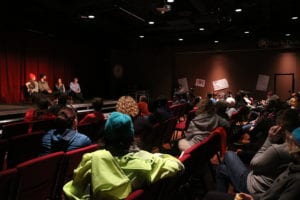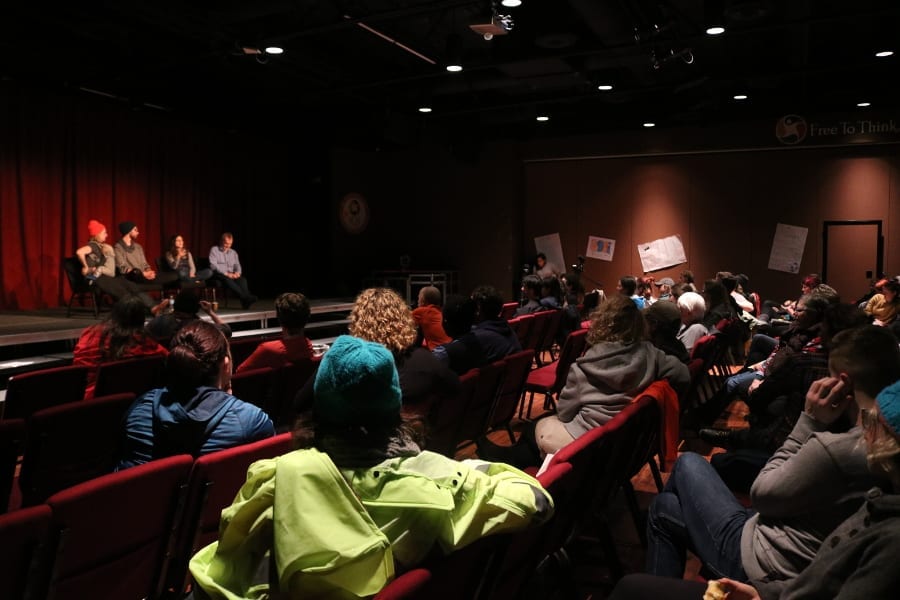Dear Campference 2019 attendees,
Welcome to this playwork conference reflection. Here’s a look back on the insights and spirit of community we experienced together.
Why do we attend conferences?
Why we gather at Playwork Conferences
To paraphrase the 20th Century poet, T.S. Eliot: ‘information is not knowledge and knowledge is not wisdom.’ In other words, it is possible to have lots of information in your memory about a particular subject but if you don’t know what it means then it’s worthless; and if you don’t know what to do with that information and knowledge then it’s largely useless. One of the great things about most playwork conferences is that they have the potential to provide all those things – information, knowledge and wisdom. There will be presentations offering hard facts about the world of playwork; and workshops run by experienced practitioners who can share their knowledge. To make the best use of the wisdom on offer we need to develop the art of judging the difference between those who offer wisdom and those who offer nonsense dressed up in the ‘emperor’s new clothes.’
Memories from Campference 2017 in California
Of course, the other great thing we get from playwork conferences is the opportunity to network, make new friends, meet like-minded people and debate with those holding different views. In 2017 I attended the first Campference. There, all those things were possible and much more besides.The event was organised by the Pop-Up Adventure Play team. Alongside the usual conference fare, it offered the unique opportunity to camp out with other Playworkers (and in some cases, their children). Set at the Eureka Villa Adventure Playground in Val Verde, near Los Angeles, the location added to the sense of adventure.
That must have seemed like a good idea when the organisers thought of it. After all, who wouldn’t want to camp out in sunny California? Unfortunately, on the second day, the heavens opened. We had a month’s rainfall in one day. The site was awash but the playwork spirit came to the fore. in the end, it felt as though the event had actually been enhanced by the incredible weather.
Global enthusiasm for playwork
However, the thing that particularly struck me about the Campference was the thirst for knowledge of the attendees. This playwork conference reflection captures that drive to learn, share and grow in our practice. People came from all over America. In some cases, far beyond. I met playwork people from Japan, Australia, Kenya and Guatemala. They came with enthusiasm and positivity. Above all, an intense desire to learn more about playwork. At the end of one of the evening sessions, I was one of the Panelists. We were given the task of summing up the playwork approach in a few words. I think the questioner probably expected me to fall back on my usual ‘fun, freedom and flexibility.’ However, I had just been talking about the therapeutic aspects of playwork and so I said “unconditional positive regard.”

Fraser on stage with Erin, Luke and Michele, the panellists at Campference 2017.
A Playworker’s core attitude: Unconditional positive regard
In this response, I was drawing on the work of Carl Rogers and Virginia Axline. Carl Rogers was a humanistic psychologist, and Virginia Axline was a play therapist. Humanistic theory views the playwork environment as one of respect, understanding, and openness from the playworker. It should be a space where the child can freely express their feelings. In this setting, the playworker takes the role of a selfless helper. Their task is to meet the child’s basic need to play. At the same time, they build warm, human relationships with the children they support.
All this may eventually enable the child to come closer to self-actualisation than might otherwise be possible. ‘Unconditional positive regard’ is the term that applies to the fundamental attitude of the playworker towards the children. The playworker who adopts that approach deeply values the humanity of the children with whom they work and most importantly, cannot be deflected from that attitude by any particular child behaviours. The attitude is constantly reconfirmed by the playworker’s “acceptance of and enduring warmth towards the children” (Mearns and Thorne,1988, p.59 – slightly paraphrased).
In closing: A hope for future Campferences
I hope the 2019 Campference lives up to expectations and that all those attending maintain ‘acceptance of and enduring warmth towards each other’ – in the spirit of playwork. May this playwork conference reflection help guide your continued journey in support of children’s play.
Prof. Fraser Brown
Leeds Beckett University
January 2019
